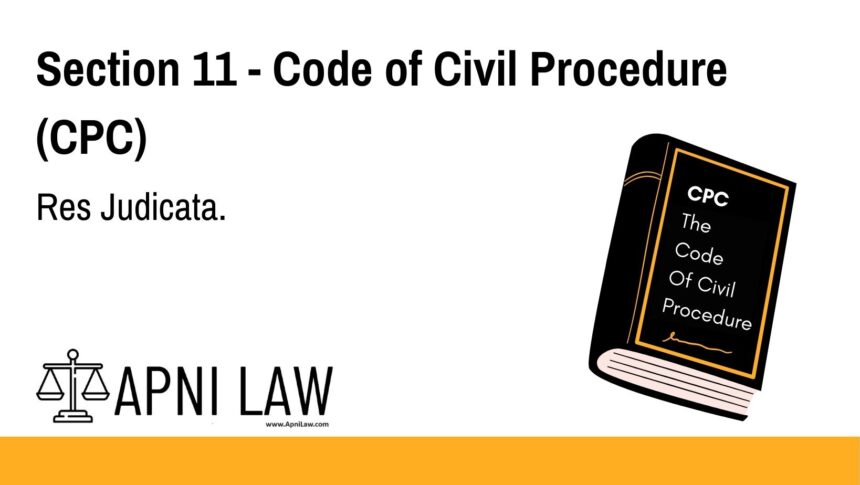Code: Section 11 CPC
“No Court shall try any suit or issue in which the matter directly and substantially in issue has been directly and substantially in issue in a former suit between the same parties, or between parties under whom they or any of them claim, litigating under the same title, in a Court competent to try such subsequent suit or the suit in which such issue has been subsequently raised, and has been heard and finally decided by such Court.”
- Explanation I: The expression “former suit” shall denote a suit which has been decided prior to the suit in question whether or not it was instituted prior thereto.
- Explanation II: The competence of a Court shall be determined irrespective of any provisions as to a right of appeal from the decision of such Court.
- Explanation III: The matter above referred to must in the former suit have been alleged by one party and either denied or admitted, expressly or impliedly, by the other.
- Explanation IV: Any matter which might and ought to have been made ground of defence or attack in such former suit shall be deemed to have been a matter directly and substantially in issue in such suit.
- Explanation V: Any relief claimed in the plaint, which is not expressly granted by the decree, shall for the purposes of this section, be deemed to have been refused.
- Explanation VI: Where persons litigate bona fide in respect of a public right or of a private right claimed in common for themselves and others, all persons interested in such right shall, for the purposes of this section, be deemed to claim under the persons so litigating.
- Explanation VII: The provisions of this section shall apply to a proceeding for the execution of a decree and references in this section to any suit, issue or former suit shall be construed as references, respectively, to a proceeding for the execution of the decree, question arising in such proceeding and a former proceeding for the execution of that decree.
- Explanation VIII: An issue heard and finally decided by a Court of limited jurisdiction, competent to decide such issue, shall operate as res judicata in a subsequent suit, notwithstanding that such Court of limited jurisdiction was not competent to try such subsequent suit or the suit in which such issue has been subsequently raised.
Explanation of Section 11 CPC
The doctrine of Res Judicata prevents courts from trying the same issue again between the same parties once it has already been adjudicated by a competent court. This principle upholds the finality of judgments, avoids duplication of legal proceedings, and ensures judicial efficiency.
Key elements:
- The matter in issue must be directly and substantially the same in both suits.
- It must be between the same parties (or their successors).
- The earlier decision must have been by a competent court.
- The matter must have been finally decided.
This section applies not just to original suits, but also to execution proceedings (Explanation VII) and even includes decisions made by courts of limited jurisdiction (Explanation VIII).
Illustration
Example 1: Civil Suit on Land Ownership
A sues B for the title of land, and the court decides in favor of B. Later, A files another suit against B, claiming co-ownership over the same land based on the same facts. The second suit will be barred under Section 11 as the issue of title was directly and substantially decided earlier.
Example 2: Court of Limited Jurisdiction
If a Rent Controller (a court of limited jurisdiction) decides that X is not a tenant, and later X files a civil suit claiming tenancy rights, the civil court will bar the suit on the basis of Res Judicata (Explanation VIII), despite the Rent Controller not being competent to try the second suit.
Common Questions and Answers
1. What is the purpose of Res Judicata under CPC?
Res Judicata ensures that no person is vexed twice for the same cause. It upholds judicial efficiency, finality of verdicts, and prevents conflicting decisions.
2. Can Res Judicata apply to interlocutory orders?
No, Res Judicata applies only when an issue has been heard and finally decided by a competent court. Interlocutory orders do not satisfy this requirement.
3. Can decisions in execution proceedings apply as Res Judicata?
Yes. Explanation VII explicitly extends the doctrine to execution proceedings as well.
4. What if the earlier court did not have jurisdiction to try the second suit?
As per Explanation VIII, even if the earlier court lacked jurisdiction to try the subsequent suit, its decision can still operate as Res Judicata if it was competent to decide the specific issue.
5. What is the difference between constructive and actual Res Judicata?
- Actual Res Judicata involves issues that were directly in dispute and decided.
- Constructive Res Judicata (Explanation IV) deals with issues that “ought to have been” raised in the previous suit but were not.








